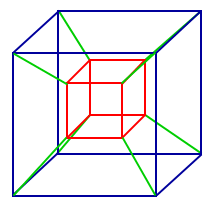If e were rational, then e = n/m for some integers m, n. So then 1/e = m/n. But the series expansion for 1/e is
1/e = 1 – 1/1! + 1/2! – 1/3! + …
Call the sum of the first n terms of this alternating series S(n). How good is this approximation to 1/e? Well, the error is bounded by the next term of the alternating series:
0 < | 1/e – S(n) | = | m/n – S(n)| < 1/(n+1)!
But multiplying through by n!, you will see that
0 < | integer – integer | < 1/(n+1) < 1.
But there is no integer strictly between 0 and 1, so this is a contradiction; e must be irrational.
Presentation Suggestions:
Use the series expansion for 1/e as a fun fact on a previous day.
The Math Behind the Fact:
Anytime you have an alternating series in which the terms decrease, then each partial sum is not farther from the limit than the next term in the series!
On an unrelated note, it is much harder to show that Pi is irrational.
How to Cite this Page:
Su, Francis E., et al. “e is irrational.” Math Fun Facts. <https://www.math.hmc.edu/funfacts>.
References:
For more about e, see Maor, e: the story of a number.
Fun Fact suggested by:
Arthur Benjamin

